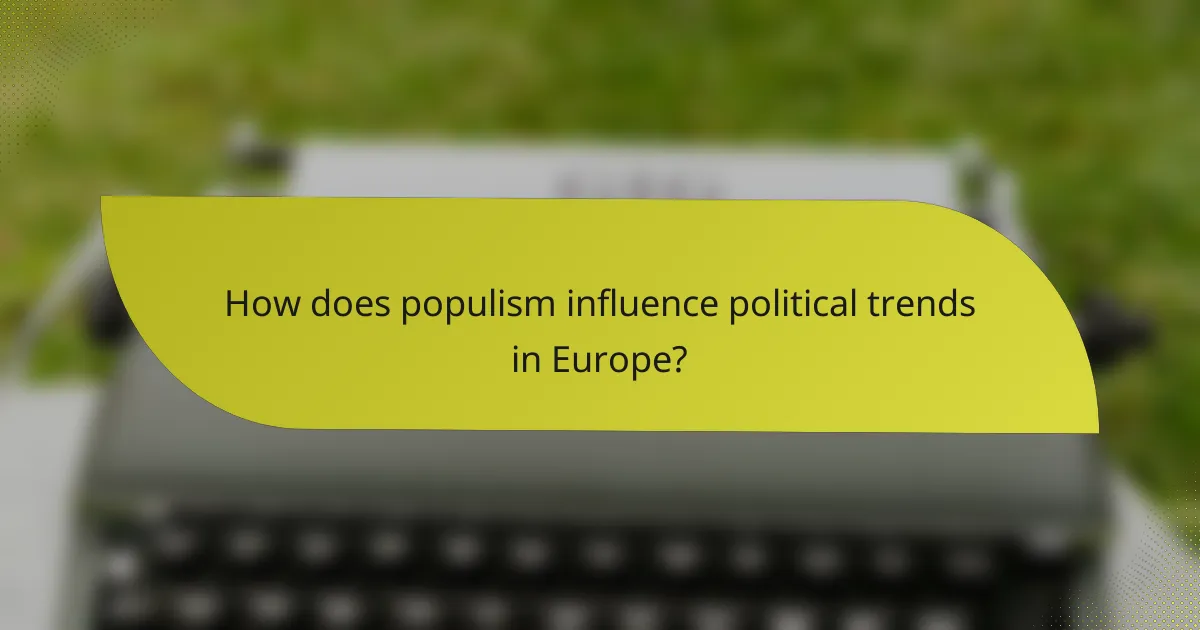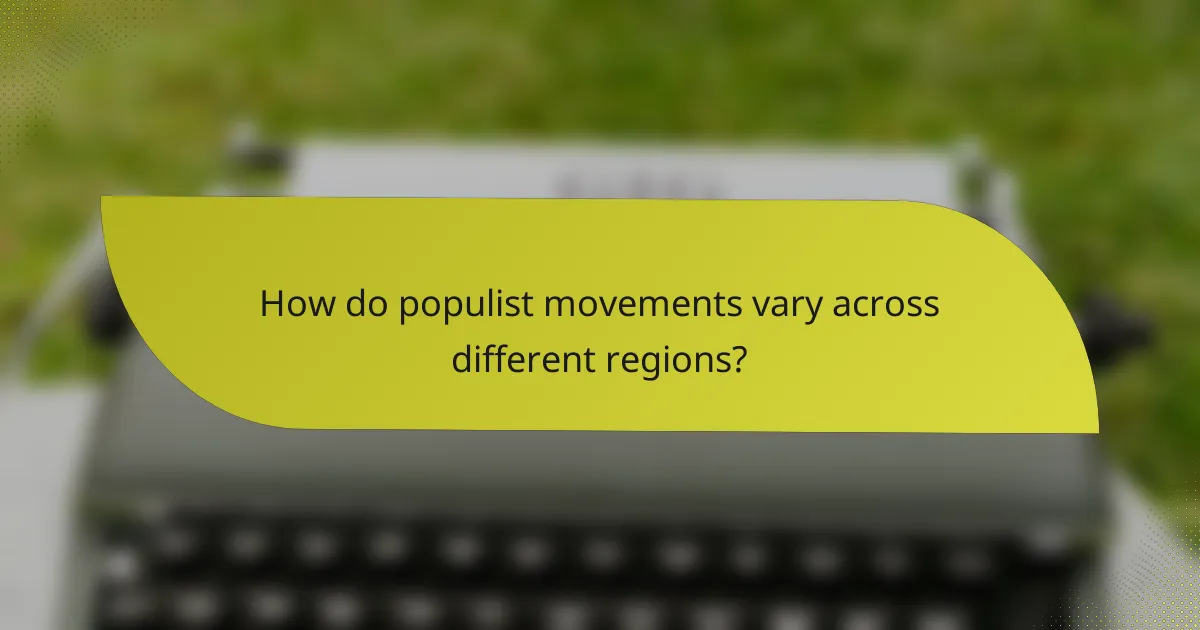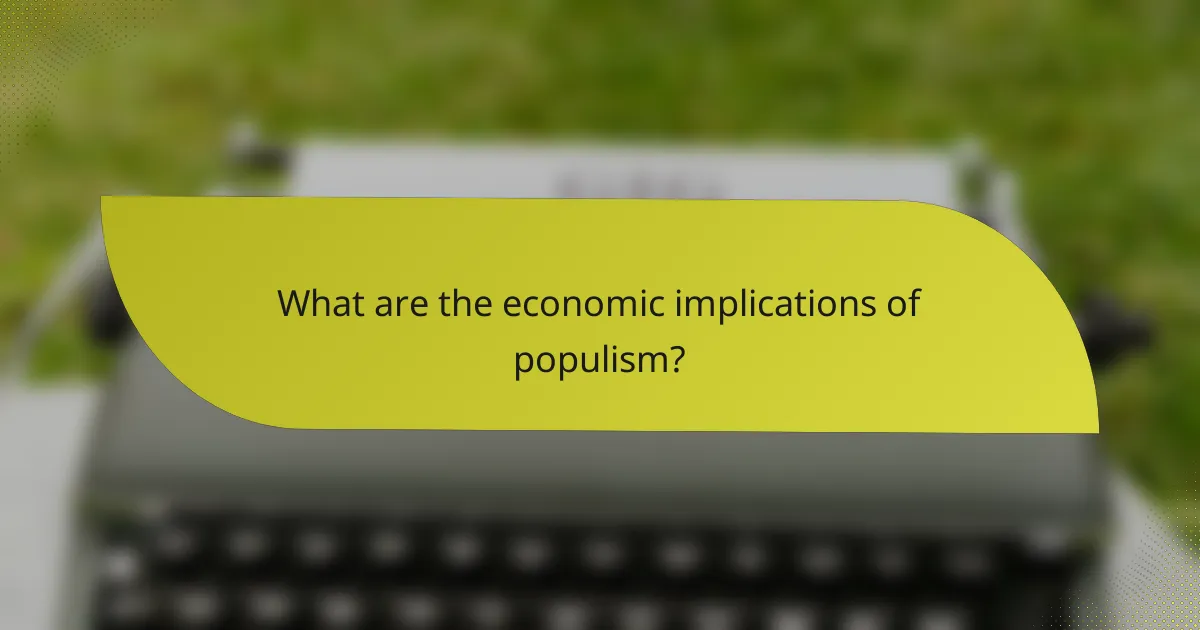Populism has emerged as a powerful force in global politics, reshaping trends and movements by emphasizing the interests of ordinary citizens in opposition to perceived corrupt elites. This phenomenon often arises from social, economic, or political grievances and manifests through the rise of new political parties that challenge established norms. As populist sentiments gain traction, they can significantly alter the dynamics of international relations, prioritizing nationalism and domestic concerns over global collaboration.

How does populism influence political trends in Europe?
Populism significantly shapes political trends in Europe by promoting nationalist sentiments and challenging established political parties. This influence manifests through the rise of new political movements that prioritize the interests of ordinary citizens over elites.
Rise of nationalist parties
The rise of nationalist parties in Europe is a direct consequence of populist rhetoric that appeals to national identity and sovereignty. These parties often gain traction by criticizing immigration policies and advocating for stricter border controls, resonating with voters who feel left behind by globalization.
For instance, parties such as the National Rally in France and the Alternative for Germany have capitalized on populist sentiments, often securing significant representation in national and European parliaments. Their success reflects a broader trend where traditional parties struggle to address the concerns of their constituents.
Impact on EU policies
Populism has led to significant shifts in European Union policies, particularly regarding immigration and economic governance. Populist leaders frequently challenge EU regulations, arguing that they undermine national sovereignty and economic stability.
As a result, the EU has had to adapt its policies to address the concerns raised by populist movements. For example, the EU has implemented stricter immigration controls and has been more flexible in its fiscal policies to accommodate member states’ demands.
Shift in voter demographics
Populism has contributed to a notable shift in voter demographics across Europe, attracting support from diverse groups, including younger voters and those from economically disadvantaged backgrounds. This shift is often driven by disillusionment with traditional political parties and a desire for change.
In many cases, populist parties have successfully mobilized voters who previously abstained from elections, leading to increased voter turnout in certain regions. This trend highlights the importance of addressing the underlying issues that fuel populist sentiments to regain trust among these demographics.

What are the key characteristics of populist movements?
Populist movements are typically defined by their focus on representing the “common people” against a perceived corrupt elite. They often emerge in response to social, economic, or political grievances, utilizing specific strategies to galvanize support.
Anti-establishment rhetoric
Anti-establishment rhetoric is a hallmark of populist movements, positioning the movement as a challenger to the status quo. This rhetoric often emphasizes distrust of traditional political institutions, portraying them as ineffective or self-serving.
Populist leaders frequently use language that resonates with the frustrations of the public, highlighting issues such as economic inequality or political corruption. For instance, during elections, candidates may promise to dismantle existing systems that they claim favor the elite over the average citizen.
Charismatic leadership
Charismatic leadership is crucial for the success of populist movements, as leaders often embody the movement’s values and aspirations. These leaders typically possess strong communication skills and a compelling personal narrative that attracts followers.
Examples include figures like Donald Trump in the United States or Jair Bolsonaro in Brazil, who have effectively used their charisma to connect with voters. Their ability to project confidence and decisiveness can significantly influence public perception and rally support.
Direct appeal to the public
Populist movements often rely on direct appeals to the public, bypassing traditional media channels to communicate their messages. This approach can include social media campaigns, rallies, and town hall meetings, allowing leaders to engage with supporters directly.
Such direct engagement fosters a sense of community and belonging among followers, making them feel that their voices are being heard. It is essential for populist leaders to maintain this connection to sustain momentum and loyalty among their base.

How do populist movements affect global governance?
Populist movements significantly influence global governance by challenging established political norms and promoting nationalist agendas. These movements often prioritize domestic concerns over international collaboration, reshaping how countries engage with one another on a global scale.
Challenges to international cooperation
Populist movements create challenges for international cooperation by fostering skepticism towards multilateral institutions and agreements. Leaders may prioritize national sovereignty, leading to a reluctance to participate in global initiatives that require compromise.
This shift can result in weakened alliances and reduced effectiveness of organizations like the United Nations or the World Trade Organization, as member states may withdraw from commitments or refuse to adhere to collective decisions.
Impact on trade agreements
Populism can disrupt existing trade agreements and hinder the negotiation of new ones. Leaders influenced by populist sentiments may advocate for protectionist policies, aiming to shield domestic industries from foreign competition.
For example, recent populist movements in various countries have led to the renegotiation or abandonment of trade deals, impacting economic relations and potentially resulting in higher tariffs and trade barriers.
Changes in diplomatic relations
Populist movements often lead to shifts in diplomatic relations, as leaders may align with countries that share similar nationalist ideologies. This realignment can create new partnerships while straining traditional alliances.
Countries may find themselves isolated or facing increased tensions with former allies, as populist leaders prioritize bilateral relationships that serve immediate national interests over long-term diplomatic strategies.

What role do social media play in populism?
Social media significantly influences populism by providing a platform for direct communication between leaders and their supporters. It enables the rapid dissemination of populist messages, mobilizes grassroots movements, and facilitates the spread of misinformation.
Amplification of populist messages
Social media allows populist leaders to amplify their messages quickly and effectively. Platforms like Twitter and Facebook enable them to reach large audiences without the filter of traditional media. This direct communication can create a sense of urgency and connection among supporters.
For example, populist figures often use catchy slogans or hashtags that resonate with their base, making it easier for these messages to go viral. This amplification can lead to increased visibility and support for their political agendas.
Mobilization of grassroots support
Social media serves as a powerful tool for mobilizing grassroots support in populist movements. By sharing calls to action, organizing events, and fostering community engagement, these platforms help convert online interactions into real-world activism.
Populist movements often leverage social media to coordinate rallies or protests, allowing supporters to connect and collaborate easily. This grassroots mobilization can be crucial in building momentum and demonstrating public backing for their causes.
Spread of misinformation
While social media can empower populist movements, it also facilitates the spread of misinformation. False narratives can quickly gain traction, often undermining informed public discourse and skewing perceptions of political issues.
Populist leaders may exploit this environment by promoting misleading information that aligns with their agendas. Users should be cautious and verify sources before sharing content, as misinformation can distort public understanding and influence political outcomes.

How do populist movements vary across different regions?
Populist movements differ significantly across regions, shaped by local political, economic, and cultural contexts. These variations can be broadly categorized into leftist, authoritarian, and right-wing populism, each reflecting distinct ideologies and strategies.
Latin America: leftist populism
In Latin America, leftist populism often emphasizes social justice, wealth redistribution, and anti-imperialist sentiments. Leaders like Hugo Chávez in Venezuela and Evo Morales in Bolivia have rallied support by appealing to the marginalized and promoting policies aimed at reducing inequality.
This form of populism typically involves strong state intervention in the economy, with a focus on nationalizing resources and expanding social programs. While it can lead to significant social improvements, critics argue it may also result in authoritarian governance and economic instability.
Asia: authoritarian populism
Authoritarian populism in Asia is characterized by strong, centralized leadership that often employs nationalism and cultural identity to consolidate power. Leaders such as Narendra Modi in India and Rodrigo Duterte in the Philippines have utilized populist rhetoric to rally support while curtailing dissent.
This approach can lead to rapid policy changes and a focus on security and stability, but it may also suppress democratic institutions and civil liberties. The balance between populist appeal and authoritarian governance remains a critical concern in these regions.
North America: right-wing populism
Right-wing populism in North America, exemplified by figures like Donald Trump, focuses on nationalism, anti-immigration sentiments, and economic protectionism. This movement often critiques established political elites and promotes a return to traditional values.
While it can energize a significant voter base, right-wing populism may also exacerbate social divisions and lead to contentious political climates. Understanding the underlying grievances that fuel this movement is essential for addressing its implications on society and governance.

What are the economic implications of populism?
Populism often leads to significant shifts in economic policies, impacting both domestic and international markets. These changes can create volatility, affecting everything from trade agreements to investment strategies.
Impact on economic policy
Populist movements typically advocate for policies that prioritize the needs of the common people over elite interests. This can result in increased government spending on social programs, often funded by higher taxes on wealthier individuals or corporations. For example, countries like Venezuela have seen extensive nationalization of industries under populist leaders, which can disrupt traditional economic structures.
However, such policies may lead to budget deficits and inflation if not managed carefully. Policymakers must balance populist demands with fiscal responsibility to avoid long-term economic instability.
Effects on investment climates
The rise of populism can create uncertainty in investment climates, as businesses may hesitate to commit capital in environments where policies can change rapidly. For instance, populist rhetoric against globalization can lead to protectionist measures, impacting foreign direct investment. Investors often seek stability and predictability, which populist policies can undermine.
To navigate these challenges, investors should closely monitor political developments and assess the potential for regulatory changes. Diversifying investments across different regions can also mitigate risks associated with populist movements.
